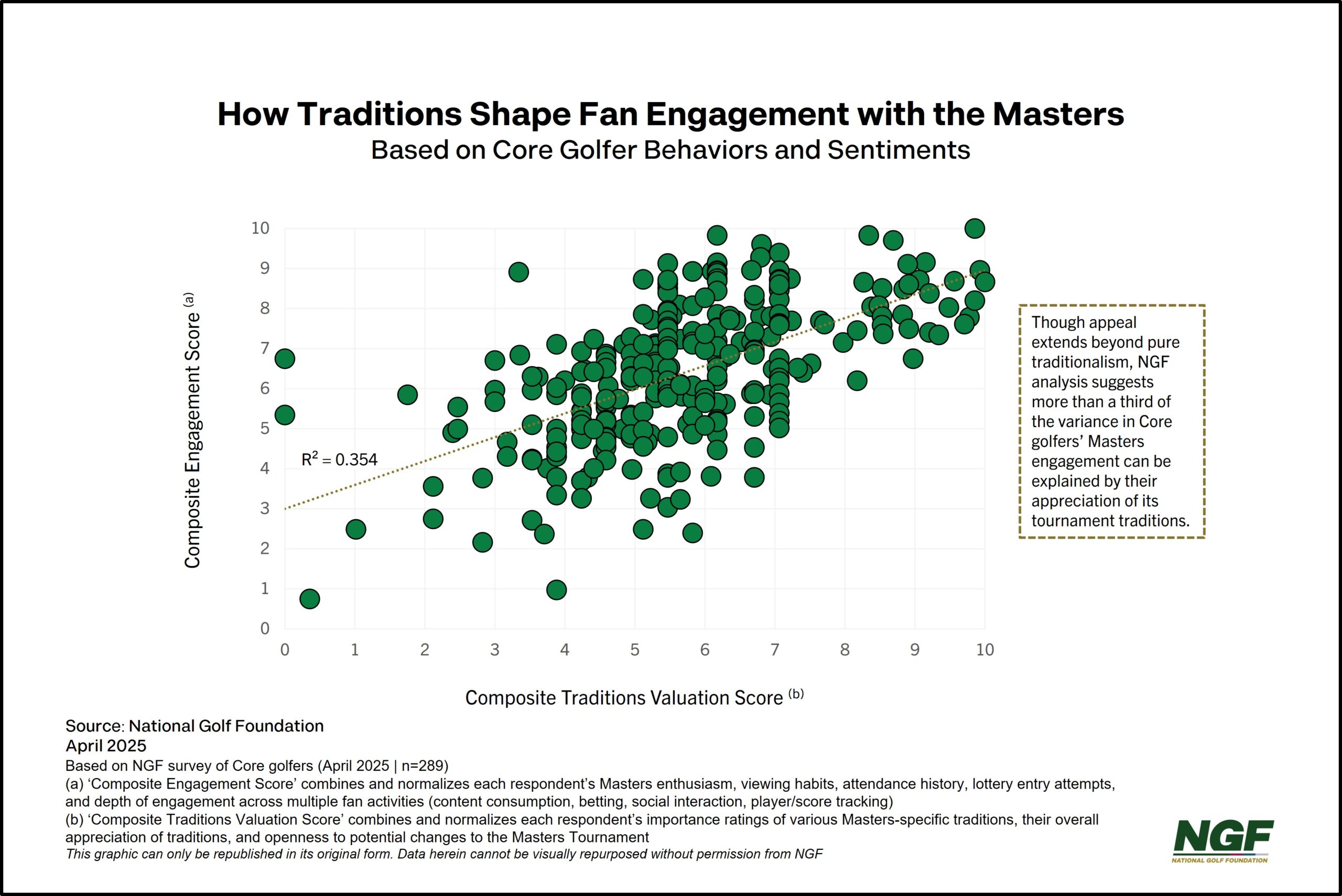A couple weeks ago, we highlighted a fundamental disconnect in golf: how an industry that prides itself on relationships has unintentionally fostered a commerce-first environment where, according to our research, most customers feel anonymous and undervalued.
Many point to loyalty programs – or, better loyalty programs – as the obvious solution to these relationship deficits. It’s a natural place to go, and when developed properly can drive significant value, but in a certain way this thinking perpetuates the exact transaction-minded approach that got us here in the first place, while also overlooking other impactful, more emotionally-resonant strategies that can build enduring loyalty without relying on points or perks.
As April shifted the golf world’s focus to the first major of the year, we find perhaps the perfect case study in achieving genuine loyalty without an explicit “loyalty” program. The Masters has cultivated one of the most passionate followings in the world. It’s a phenomenon worthy of attention, and one that can propel our discussion. So, let’s explore just two concepts that will help shape this week’s festivities, and our enjoyment of them as both patrons and viewers.
Loss Leaders
Augusta’s famously affordable concessions showcase the power of strategic underpricing. Just like Nespresso’s $1 coffee machine, or Costco’s $1.50 hot dog combo, so-called “loss leaders” can generate disproportionate goodwill and signal confidence in the core experience. They also serve as economic commitment devices. Coastal Carolina University just went *all in* on the idea, announcing free concessions at football games this fall – a bold move that invites serious financial exposure, but with the objective of boosting attendance and building emotional attachment far exceeding the investment. They’ll also capture valuable fan data and contact information, since access will require engagement with the University’s new app).
Perhaps most powerfully, though, loss leaders have the potential to become part of the brand identity itself, which yields the highest loyalty payoff. Customers don’t just return for the economic benefit, but because these touchpoints become meaningful rituals – inseparable from how they define and value the overall brand experience. There’s a reason Beaver Creek Resort still hands out free warm chocolate chip cookies to skiers, or why Five Guys serves complimentary peanuts – these aren’t just freebies, they’re emotional anchors.
Of course, it takes more than slashing prices or giving things away to create true loyalty. The secret lies in how seamlessly these offerings integrate into the broader customer experience, and how they address relevant emotional needs at key moments. Warm cookies hit different after a cold day on the slopes; a glass of champagne at the salon turns a personal moment into a personal celebration. Effective strategies either smooth specific friction points or convert ordinary transactions into moments of unexpected delight – which customers remember long after the monetary value is forgotten.
If you created a word cloud using all the literature on customer loyalty,
‘consistency’ would loom so large that other terms
would appear as mere footnotes by comparison
Consistency
This is the big one. Consistency might seem like a prosaic virtue in a business world obsessed with innovation, but across virtually every discipline that studies human relationships, it emerges as the bedrock of loyalty. If you created a word cloud using all the literature on customer loyalty, ‘consistency’ would loom so large that other terms would appear as mere footnotes by comparison.
Despite its simplicity – or maybe because of it – consistency also remains one of the most underexploited loyalty drivers in business. But not at Augusta. The Masters relentlessly prioritizes this principle through meticulous commitment to excellence, detail, and unchanging traditions – azaleas, green jackets, the hypnotically wistful theme song … the list goes on and on.

The consistency effect is incredibly powerful and transcends conscious consumer analysis. When people can predict their experience with absolute certainty, they’re freed from the vigilance that characterizes most customer experiences and interactions. They enter a psychological sanctuary, where cognitive load diminishes and emotional bonds can flourish – beyond what any transaction or points program might achieve.
Consider how the TV show Survivor has maintained a cult following for more than 20 years, with host Jeff Probst religiously using the exact same phrases episode after episode (“The tribe has spoken,” “Immunity is back up for grabs,” “Want to know what you’re playing for?”). Whether we realize it or not, the same principle also contributes significantly to fast food’s appeal, with Chick-fil-A taking things to an entirely new level across every touchpoint – and earning remarkable loyalty as a result.
Consistency’s loyalty-building power is also amplified when the senses are engaged. That’s why luxury hotel chains develop signature scents to permeate their properties worldwide, ensuring guests feel ‘at home,’ whether in San Francisco or Singapore. Multi-sensory touchpoints help signal safety, recognition and belonging. The effect is particularly potent with scent, as olfactory signals travel to the part of the brain where emotions and memories are processed – thus creating stronger neural pathways than visual or auditory stimuli alone.
Looking Beyond Programs
As we continue exploring golf’s relationship challenges, these principles remind us that true loyalty often emerges from thoughtful strategies that address emotional needs, rather than just incentivizing a next purchase. The question for golf businesses isn’t necessarily whether they need a loyalty program, but how they might apply certain concepts – a signature welcome ritual, strategically-timed comfort moments, etc. – to create distinction and foster deeper, more rewarding connections.
We welcome the opportunity to discuss how your business might leverage certain evidence-based loyalty principles to inspire a more devoted following.
David Lorentz has served as Chief Research Officer at the National Golf Foundation since 2019, after joining the organization as an analyst in 2012. Lorentz leads a team dedicated to empowering golf business leaders through data-driven insights. Known for his rational thinking, economic mindedness, and human-focused approach, he brings valuable perspective and foresight to understanding the evolving business and consumer. Industry leaders rely on Lorentz's original research and insights to inform strategic decisions across both commercial and industry levels. He holds an M.S. in Applied Economics and Statistics from Clemson University and a B.A. in Economics from Xavier University. Lorentz is also a very proud native of Cincinnati, Ohio.




